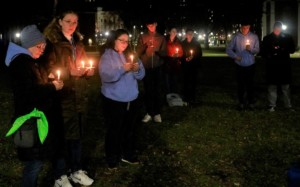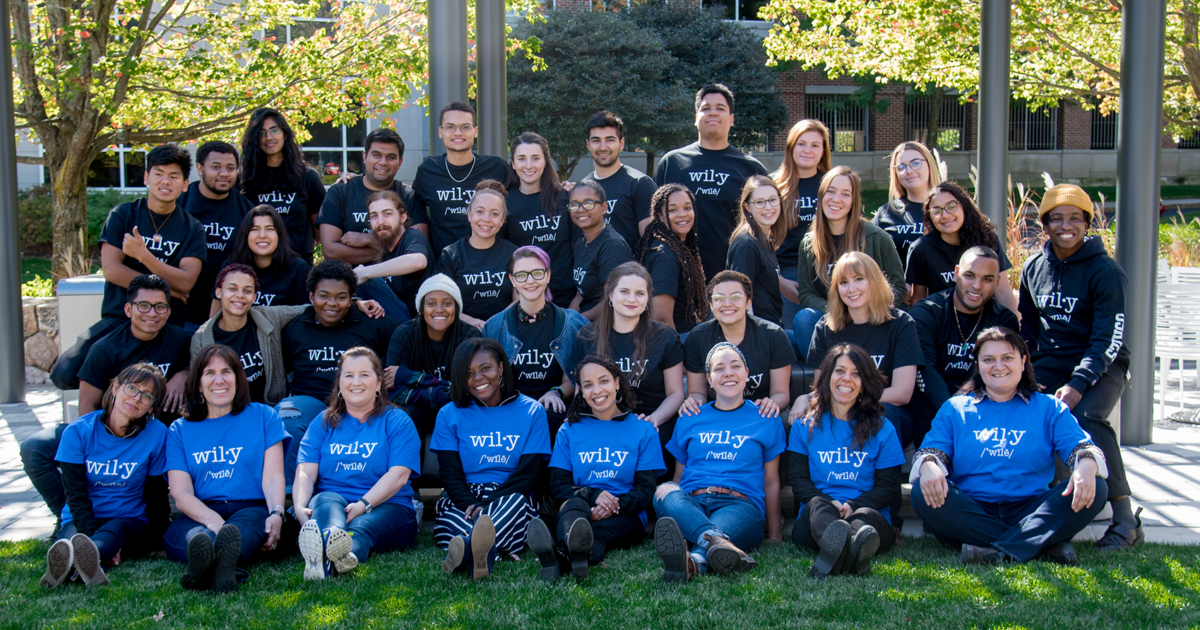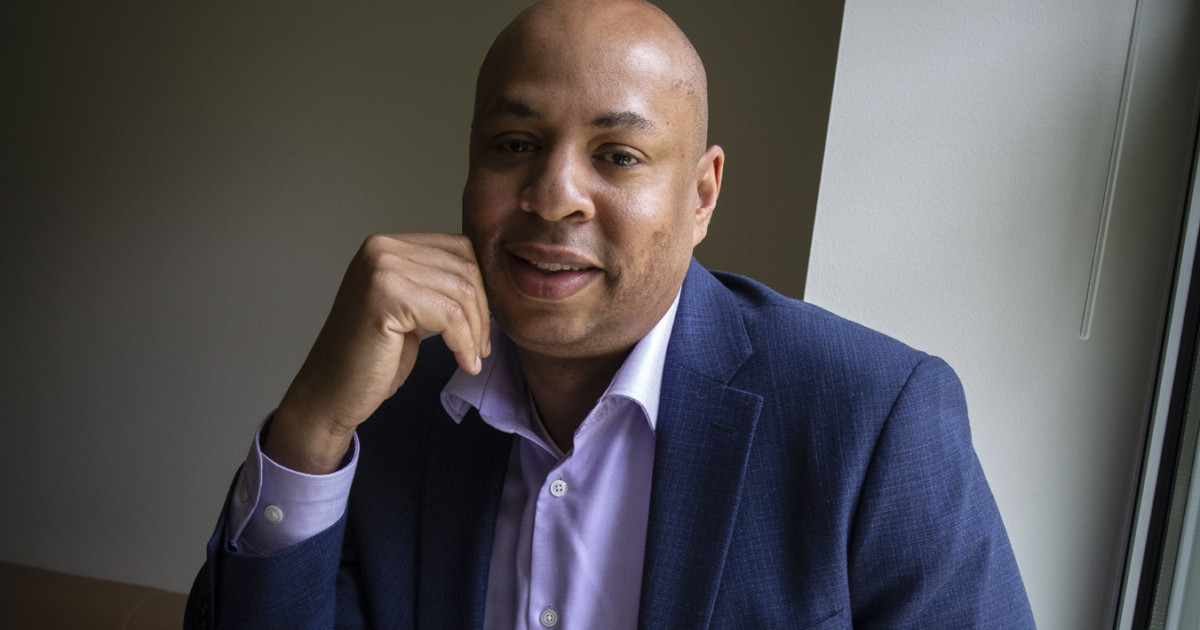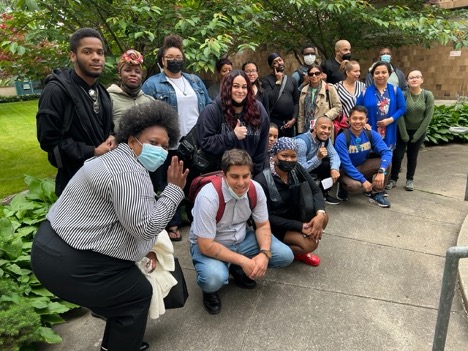Alicia Floyd is still on the clock when she sits down to record. Leaning forward, she films herself from the shoulders up, dressed in a black scrub top, with the pale, empty walls of a hospital call room behind her. “Briefly,” she recounts, “my story is that I matriculated in 1998, and I graduated in 2005.” The 42-year-old transplant to South Dakota speaks with the measuredness of the doctor she has become and the compassion of the patient she once was. “And those were not good years for me.”
More than two decades ago, an overdose and two hospitalizations prolonged Alicia’s undergraduate career at Yale College. Now she’s taping messages of support for current students as a leading member of Elis for Rachael, a largely alumni-run group advocating for mental health reform in higher education. The organization, which recently acquired non-profit status, emerged from discussions over Facebook and on Zoom in the wake of the suicide of first-year student Rachael Shaw-Rosenbaum. Friends and family of Rachael are also key active members. Days before her death in March 2021, the 18-year-old fretted in Reddit posts about being forced to leave school if she returned to the psychiatric hospital, where she had already been once the previous semester.
When the community found out, long-standing concerns about the Ivy League university’s medical withdrawal policies resurfaced, then overflowed. From across the country, alumni formed Elis for Rachael with the perspective of having battled these policies and the distance to now believe they shouldn’t have had to, Alicia said. As graduates, they’re betting on their station to hold Yale’s feet to the fire in a way that enrolled students can’t. “It’s meant a lot to me to be able to come back and speak with current students,” she said. “I see myself in them, and I see the opportunity to help give them a voice and to let them know that, ‘Your gut is right. This is not normal how you’re being treated. Don’t let them convince you otherwise.’”

From left to right: Rishi Mirchandani, Paul Johansen, and Alicia Floyd, alumni leaders of Elis for Rachael, met in person for first time at the Harvard-Yale football game in November 2021.
The truest test of the group’s influence may be rounding the corner now that it, along with two individual students, has brought a proposed class action lawsuit against Yale. As of November 30, 2022, its allegations of discrimination against students with mental health disabilities have appeared in many of the nation’s major newspapers. The Washington Post’s coverage of the impact of the university’s withdrawal policies for suicidal students has been ongoing since an expose on the topic, “What if Yale Finds Out?” came out last month. With the world of higher education watching, Elis for Rachael could turn the spotlight on not only medical withdrawal reform but alumni advocacy as a path to improved mental health care on college campuses.
The crux of complaints stems from a tragic history of reports that the university pressures students to withdraw amidst mental health crises and makes the process of returning to campus emotionally and financially trying. In 2014, one student’s story in the Yale Daily News about being told to take a medical leave struck Alicia Floyd as “eerily similar” to her own ten years prior. The author, Rachel Williams, describes being strapped down and strip searched between local psychiatric wards, putting on her ‘sanest face’ for the university officials with final say over her enrollment status, and succumbing to a fit of tears on the plane ride home. The next year, another student, Luchang Wang, died from suicide, leaving behind a note expressing her fear of being forced to withdraw from Yale and not being able to return for up to a year, if ever.
For Rishi Mirchandani, a member of Yale’s class of 2019 and another leader of Elis for Rachael, Yale’s mental health practices feel symptomatic of a larger succeed-or-leave culture he believes has long dominated the campus. “These grievances dated back as many as 50 or 60 years because a lot of the restrictive, inflexible and discriminatory policies that have been in place have existed since the 1960s and were based on the social norms and the understanding of psychiatry that existed at that time,” he said. A reluctance to veer from the notion of rigor as a virtue may be slowing accommodations at not only Yale but many of its prestigious peers. In 2018, the Ruderman Family Foundation published a report on mental health withdrawal policies across the Ivy League, awarding the University of Pennsylvania the highest score: a D+. For Yale, an F.
Ironically, given the ongoing lawsuit against Yale, Rishi also imagines his alma mater tends to remove vulnerable students from campus to avoid liability, specifically were a student to self-harm. “Ivy Leagues understand that they have a lot of eyes on them, and so they’re particularly concerned about media coverage if there is some kind of tragedy on campus,” he said.

In April 2022, Elis for Rachael organized a vigil in honor of suicide prevention.
Elis for Rachael members recognize that taking a medical leave is the best option for some, Rishi said, but maintain it should not be the only option. For nearly two years before going to court, they’ve advocated for increased flexibility and support in the medical withdrawal process. One of their earliest and lasting initiatives is a petition with ten items that include involving students more in decisions around their withdrawal, providing actionable explanations for rejecting any applications to return, and expanding access to and reducing costs of health services. Beyond that, outreach and discussions with current students have let alumni keep tabs on the goings on of campus leaves and, Alicia Floyd said, offer perspective and words of encouragement to those who may be struggling. Fundraising efforts—boosted by the organization’s recently acquired non-profit status which opens the door for tax-deductible donations—have supported basic needs like rent and groceries for students on leave due to mental health issues. A vigil this past April brought community members together in New Haven in honor of suicide prevention.
In response to the recent lawsuit, a Yale spokesperson said in a statement to The Washington Post: “The university is confident that our policies comply with all applicable laws and regulations. Nonetheless, we have been working on policy changes that are responsive to students’ emotional and financial wellbeing.”
Indeed the university has made changes to its medical withdrawal policies, including some of those outlined in the Elis for Rachael petition. In April 2022, Yale announced that students would no longer need to interview with the chair of the Committee on Reinstatement nor complete any coursework to regain entry after a withdrawal. Elis for Rachael members had refuted the necessity of meeting with this committee chair, a non-medical professional, as well as highlighted the financial burdens of enrolling in additional coursework. Although the amendments can’t be tied directly to the alumni work, Rishi feels encouraged by the response to their efforts so far. “We have literally hundreds of people who’ve contributed in some way or another, be it by contributing their time for research, contributing financial resources to assist current students, signing petitions, raising awareness, showing up to our activism events to spread awareness. There’s just really broad support for our mission.”
How important are the messengers to the success of the mission? To Paul Johansen, who graduated from Yale in 1988 and now helps lead Elis for Rachael, they’re critical. He joined Elis for Rachael not only because he’s dealt with mental health struggles but also out of dismay that the university had yet to comply with the recommendations of several student reports on Yale’s mental health infrastructure, including one authored by a close relative of his. “I felt like, well, if you’re not going to listen to students, maybe you’ll listen to alumni. We have levers of influence that students don’t,” Paul said. “It just seemed like a no-brainer.”
Elis for Rachael may be able to work around some of the strategies Paul and Rishi both think Yale uses to evade enduring complaints about its mental health practices—namely, waiting until the protests graduate with the students voicing them. But alumni, as Paul put it, don’t graduate. “A, we’re not going anywhere. B, we’re a bigger group. C, many of us, like Alicia, are further along in their careers. They’re well established. They have more confidence,” he said. “They know that this is unusual. There are a lot of schools that are not nearly this bad and most of them don’t have $42 billion endowments.” The need to fund that endowment plays into the hands of alumni, as well. “They’re donors. Money talks.”
However hard they push, many of those demanding change at Yale feel they’re acting out of loyalty, rather than malice. “My discontent about Yale’s mental health policies and practices is not because I didn’t enjoy my time at Yale. It’s because the process of not being there was really frustrating,” Rishi said. Meanwhile, Paul, who Alicia referred to as “Mr. Yale,” sees Elis for Rachael, like being treasurer of his local Yale Club, as service to the community. “I think any institution that has as much power and influence as Yale has is not going to be perfect, and it does a whole lot of stuff really, really well,” he said. “It doesn’t need me to help them with those things. What it needs me for, as somebody who has struggled with mental illness, is to say there are a lot of people who are out there who you ignore and who you treat badly, and I know what it’s like to be one of those people.”
“We’re trying to save Yale from itself,” Alicia said. In her mind, there are two Yales: “One is Yale, the thought leader. Yale, the group of creative and brilliant minds from students to faculty joining together and doing amazing things. And the other is corporate Yale, which serves itself and is necessary to an extent for the continuation of the other part of Yale, but I think has overstepped.”
The road ahead looks long, the organizers said, but they’re bent on building their momentum to date. They’ll remain focused on moving the needle on leave policies at Yale, while looking for ways to connect with and learn from peer institutions. Perhaps, Rishi considers, the press coverage in The Washington Post, as well as the many eyes regularly on Yale, will inspire not only change on their campus, but a trickledown effect elsewhere. Either way, they’re invested in more than just written policy revisions. “One of my takeaways is that policy change is not the end of the story. You have to remain vigilant even once you get policy change to make sure it’s being implemented in the way it was designed,” Paul said.
When Alicia and Paul attended this year’s Harvard-Yale football game, like last year, they made rounds for petition signatures, handed out buttons, and navigated a few tense discussions with other alumni about their mental health trials as students. Once inside the stadium, they took their seats and cheered for their alma mater.




